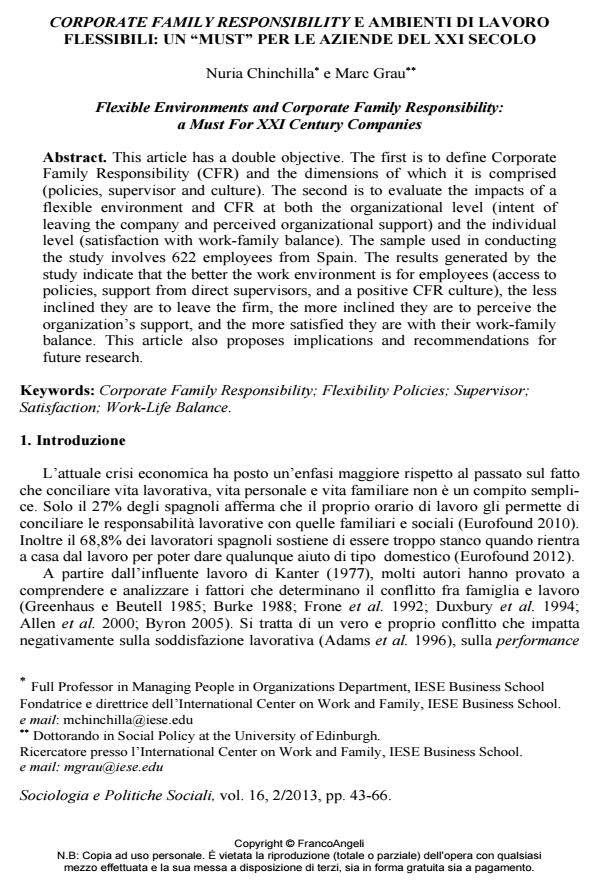Corporate family responsibility e ambienti di lavoro flessibili: un "must" per le aziende del XXI secolo
Titolo Rivista SOCIOLOGIA E POLITICHE SOCIALI
Autori/Curatori Nuria Chinchilla, Marc Grau
Anno di pubblicazione 2013 Fascicolo 2013/2
Lingua Italiano Numero pagine 23 P. 43-65 Dimensione file 396 KB
DOI 10.3280/SP2013-002003
Il DOI è il codice a barre della proprietà intellettuale: per saperne di più
clicca qui
Qui sotto puoi vedere in anteprima la prima pagina di questo articolo.
Se questo articolo ti interessa, lo puoi acquistare (e scaricare in formato pdf) seguendo le facili indicazioni per acquistare il download credit. Acquista Download Credits per scaricare questo Articolo in formato PDF

FrancoAngeli è membro della Publishers International Linking Association, Inc (PILA), associazione indipendente e non profit per facilitare (attraverso i servizi tecnologici implementati da CrossRef.org) l’accesso degli studiosi ai contenuti digitali nelle pubblicazioni professionali e scientifiche.
This article has a double objective. The first is to define Corporate Family Responsibility (CFR) and the dimensions of which it is comprised (policies, supervisor and culture). The second is to evaluate the impacts of a flexible environment and CFR at both the organizational level (intent of leaving the company and perceived organizational support) and the individual level (satisfaction with work-family balance). The sample used in conducting the study involves 622 employees from Spain. The results generated by the study indicate that the better the work environment is for employees (access to policies, support from direct supervisors, and a positive CFR culture), the less inclined they are to leave the firm, the more inclined they are to perceive the organization’s support, and the more satisfied they are with their work-family balance. This article also proposes implications and recommendations for future research.
Parole chiave:Corporate Family Responsibility; Flexibility Policies; Supervisor; Satisfaction; Work-Life Balance.
- Debating Bad Leadership Esther Jiménez, Nuria Chinchilla, Marc Grau-Grau, pp.121 (ISBN:978-3-030-65024-7)
- Análisis interseccional de las políticas de conciliación trabajo-familia en la Unión Europea y en España Paul Parra-Moreno, María José López Álvarez, Rosalía Mota López, in Investigaciones Feministas /2022 pp.163
DOI: 10.5209/infe.78352 - Rethinking Work-Family Balance in Italy: Case Studies and Innovative Strategies Isabella Crespi, Melanie Sara Palermo, in Corvinus Journal of Sociology and Social Policy /2024 pp.103
DOI: 10.14267/CJSSP.2024.1.5
Nuria Chinchilla, Marc Grau, Corporate family responsibility e ambienti di lavoro flessibili: un "must" per le aziende del XXI secolo in "SOCIOLOGIA E POLITICHE SOCIALI" 2/2013, pp 43-65, DOI: 10.3280/SP2013-002003